You were rude....that type of comment was totally uncalled for. You have embarrassed your DIL and your son but most of all you should be embarrassed by your callous and cutting remark. I don't blame either your DIL or son for being upset. After your son's remark it sounds like this has been an on-going situation. You are degrading your DIL to try to make yourself look better. SHAME ON YOU. You best go to them, on bended knee, ask for forgiveness and promise never to do it again.....then don't. Bend over backwards to make amends to them both. If there were other guests I would suggest to also apologize to them for your bad behavior.
I Made an “Innocent” Joke About My DIL's Weight During a Family Dinner
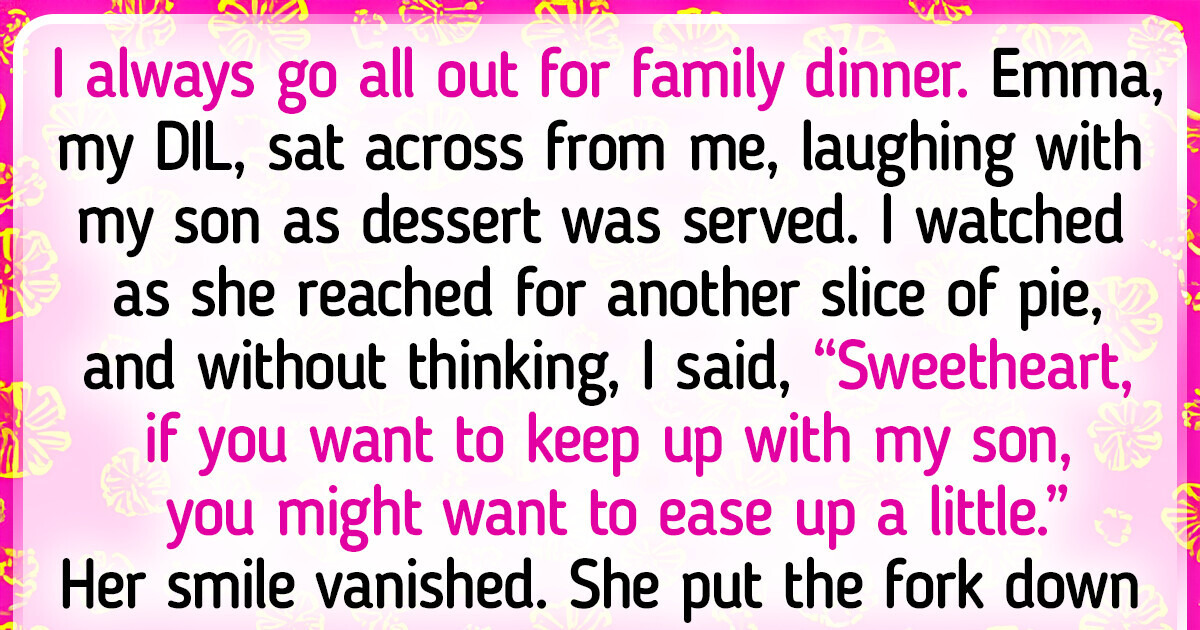
A Bright Side reader shared a surprising story about a dinner that started with laughter but ended in unexpected tension. What seemed like a harmless joke quickly unraveled into something much deeper, proving that humor isn’t always universal—what one person finds funny might cut deeper than they realize.
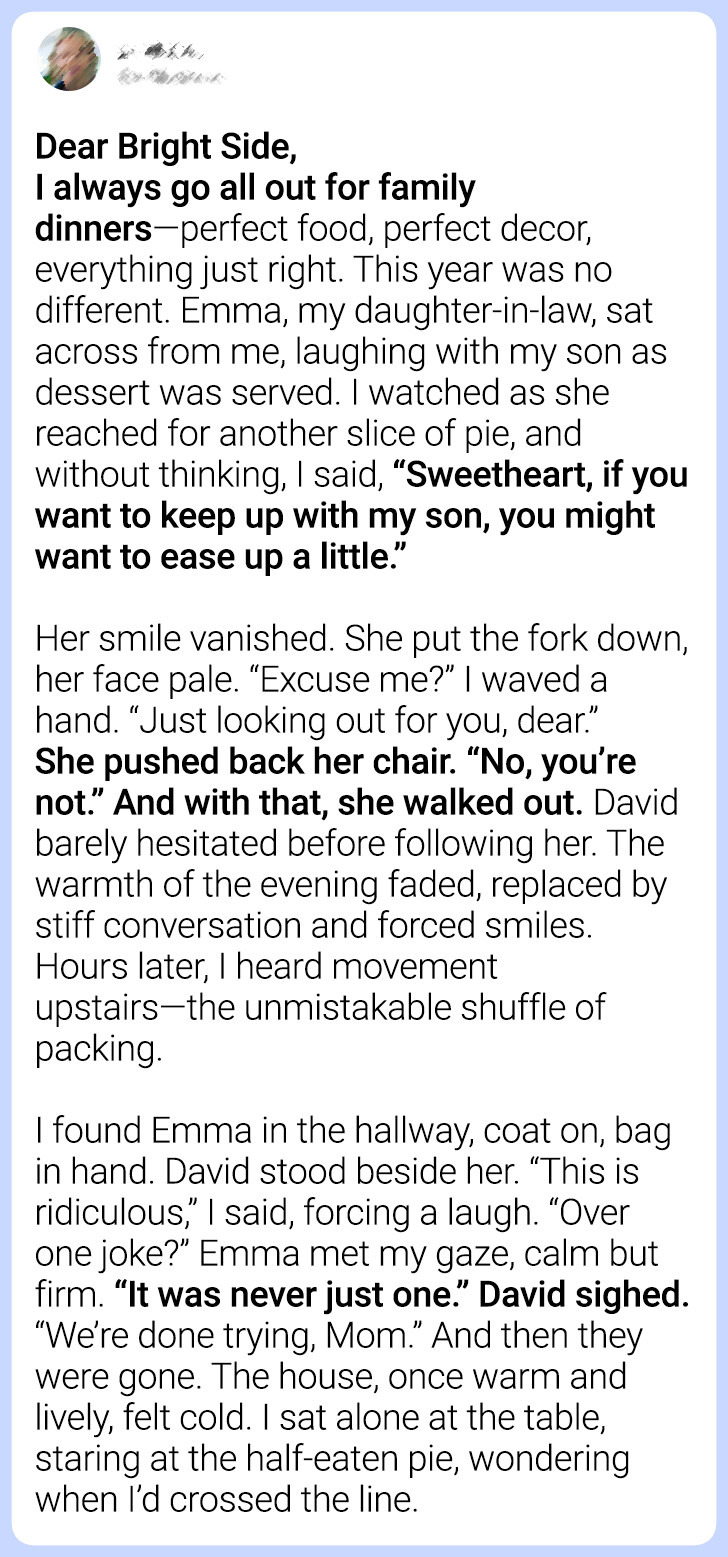
Thanks for sharing your story and reaching out for advice. We’re here to offer support, honesty, and some perspective. Let’s dive into this together and see what lessons we can pull from it—not just for you, but for anyone navigating the ups and downs of family dynamics.
Acknowledge the impact
Take full responsibility for the comment you made. Even if it wasn’t meant to hurt, it clearly did. Acknowledge that your words affected Emma, and don’t downplay or justify the remark. A heartfelt apology that shows you understand why it hurt her will go a long way in showing that you care about her feelings. Avoid using phrases like “I didn’t mean it like that” or "It was just a joke"—focus on how she felt in the moment.
Words matter, especially with family
Words hit harder than we realize, especially during family get-togethers. What seems like a harmless joke can land a lot deeper than intended, especially when emotions are running high. That comment about Emma’s weight, though meant to be funny, probably touched on some old insecurities she’s been carrying.
As someone close to her, your words can either lift her up or leave a mark. Humor is a great way to connect, but when it crosses into sensitive territory like body image, it can backfire. Emma’s reaction tells us this isn’t the first time it’s happened. For real family bonds to grow, respect and empathy are key—let humor bring you closer, not push you apart.
Give space, then reach out
Sometimes, the best way to start mending things is by giving people the space they need to cool off. However, don’t let that space last too long. After a day or two, reach out to Emma and David. A message, phone call, or even a handwritten note that says something like, “I realize my words hurt, and I’m truly sorry for that” can be a great first step. It’s important to show that you respect their need for time but that you’re also eager to make things right when they’re ready.
Building trust with Emma: small changes, big impact
Healing takes time, but it starts with changing how we show up for each other. With Emma, try focusing on appreciation rather than playful teasing. Highlight her strengths and remind her of how much she’s valued in the family. Trust grows in an atmosphere of support and open conversations. Make room for honest talks where everyone feels safe to speak without fear of judgment.
This doesn’t mean you have to completely change who you are, but you can adjust your humor to lift Emma up rather than risk hurting her. Small, thoughtful gestures—a sweet note, including her in family activities, or just being there to listen—can go a long way. Rebuilding trust is a process that requires consistency and respecting boundaries, but it’s worth it for stronger, more connected relationships.
Show through actions
Words alone don’t always fix things—actions speak louder. Moving forward, make sure your actions reflect the change you want to see. If you’ve hurt someone with jokes or comments in the past, avoid those kinds of remarks in the future. Be more mindful of Emma’s feelings and show her through your behavior that you respect and value her. Small gestures—like including her more in conversations, showing interest in her life, or even apologizing for past instances—can help rebuild the bond over time and show her you truly care.
Having a peaceful relationship with your daughter-in-law isn’t always easy, but with time and effort, it can improve. We’ve heard plenty of similar stories where others have faced the same struggles, and with some patience, they’ve found their way to better understanding.
Comments
Related Reads
15 Family Secrets That Could Top Google Searches
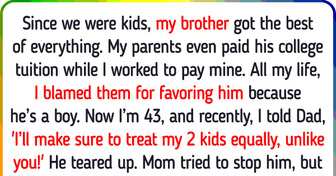
My Mother-in-Law Accused Me of Stealing, Karma Stepped In With a Twist
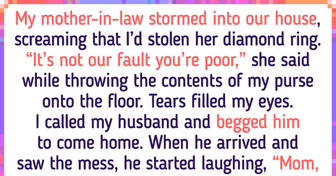
15 People Who Disturbingly Found Out Their Partner Was “Not the One”

MIL Invited Us to FIL’s Bday But Expected Me to Pay $100—I Refused

16 Shopping Stories That Prove a Trip to the Supermarket Can Be More Entertaining Than a Blockbuster Movie

My Parents Wanted a ‘Family Vacation’ on My Budget—I Made One Move They Didn’t Expect

I Turned Down a Promotion and Got Fired—My Revenge Was Brutal

12 People Whose Kind Hearts Became a Lifeline in Someone’s Darkest Moment
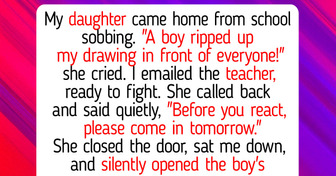
I Refused to Talk to My Parents After They Chose My Ex-Wife Over Me

I Refused to Follow My Boss’s Dress Code—HR Had to Step In

10 Times a Moment of Pure Cruelty Was Actually a Secret Act of Kindness
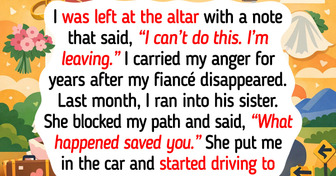
I Refuse to Earn Pennies While My Manager Cashes a Fortune




